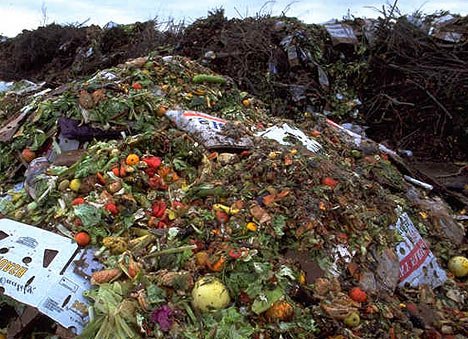
A recent United Nations report reveals that the food the world wastes produces more greenhouse gas emissions than any country except for China and the US.
Every year about a third of all food for human consumption, around 1.3 billion tonnes, is wasted, along with all the energy, water and chemicals needed to produce it and dispose of it.
Almost 30% of the world’s farmland, and a volume of water equivalent to the annual discharge of the River Volga, are in effect being used in vain.
In its report, released this week, entitled The Food Wastage Footprint, the UN Food and Agriculture Organization (FAO) estimated that the carbon footprint of wasted food was equivalent to 3.3 billion tonnes of carbon dioxide per year.
If it were a country, it would be the world’s third biggest emitter after China and the United States, suggesting that more efficient food use could contribute substantially to global efforts to cut greenhouse gases to limit global warming.

In the industrialized world, much of the waste comes from consumers buying too much and throwing away what they do not eat. In developing countries, it is mainly the result of inefficient farming and a lack of proper storage facilities.
“Food wastage reduction would not only avoid pressure on scarce natural resources but also decrease the need to raise food production by 60% in order to meet the 2050 population demand,” the FAO said.
The report suggested improving communication between producers and consumers to manage the supply chain more efficiently, as well as investing more in harvesting, cooling and packaging methods.
It also said consumers in the developed world should be encouraged to serve smaller portions and make more use of leftovers. Businesses should give surplus food to charities and develop alternatives to dumping organic waste in landfill.
The FAO estimated the cost of the wasted food, excluding fish and seafood, at about $750 billion a year, based on producer prices.
The wasted food consumes about 250 cubic km of water and takes up about 1.4 billion hectares – much of it diverse natural habitat that has been cleared to make it arable.
[youtube IoCVrkcaH6Q]